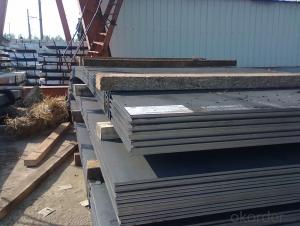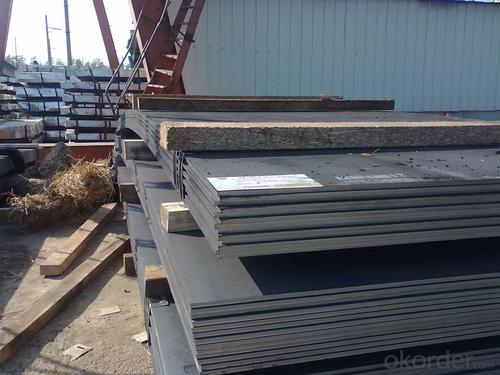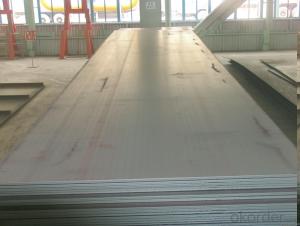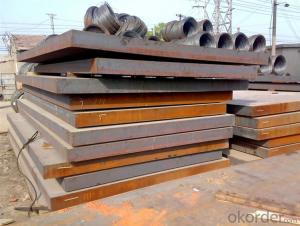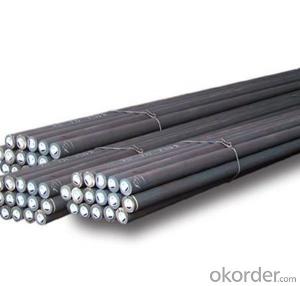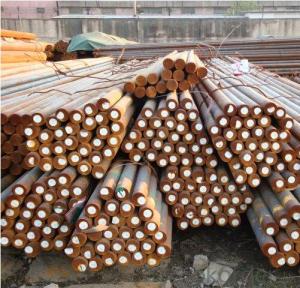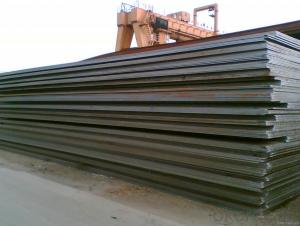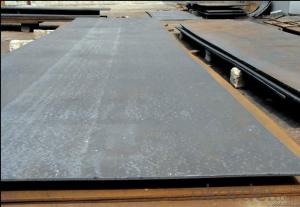Special Steel Cr12MoV Cold Working Die Steel Plate
- Loading Port:
- China main port
- Payment Terms:
- TT OR LC
- Min Order Qty:
- 25 m.t.
- Supply Capability:
- 10000 m.t./month
OKorder Service Pledge
OKorder Financial Service
You Might Also Like
Specification
The details of our Steel
1. Produce Standard: as the GB, AISI, ASTM, SAE, EN, BS, DIN, JIS Industry Standard
2. Produce processes: Smelt Iron -EAF smelt Billet - ESR smelt Billet -Hot rolled or forged get the steel round bar and plate
3. Heat treatment:
Normalized / Annealed / Quenched+Tempered
4. Quality assurance:
All order we can received Third party inspection, You can let SGS, BV,.. and others test company test and inspect our products before Goods shipping.
Product information
Chemical Composition(%)
Country | Standard | C | Si | Mn | Cr | Mo | V | S | P | W |
GB | C12MoV | 1.45-1.70 | ≤0.40 | ≤0.40 | 11.00-12.5 | 0.40-0.60 | 0.15-0.30 | ≤0.030 | ≤0.030 | |
DIN | 1.2601 | 1.55-1.75 | 0.25-0.40 | 0.20-0.40 | 11.00-12.0 | 0.50-0.70 | 0.10-0.50 | ≤0.030 | ≤0.030 | 0.40-0.60 |
Available Size
Rolled flat steel | 12-90mm×205-610mm×L |
Forged flat steel | 100-300mm×400-600mm×L |
Heat Treatment
Item | Temperature℃ | Hardness |
Anneal | 850-880 | ≤255HB |
Quenching | No.1:980-1040 | 60-63HRC |
No.2:1050-1130 | 42-50HRC | |
Tempering | No.1:200-300(1) | 57-60HRC |
No.2:200-300(2-3) | 58-62HRC |
Applications: Suitable for various complicated cold working dies with high precision and long lifetime,such as punching dies,cold extrusion dies,thread rolling dies,screw plates,cold extrusion dies,and precise measuring devices
Product show

Workshop show

- Q: How does special steel contribute to the oil and gas aftermarket industry?
- Special steel plays a crucial role in the oil and gas aftermarket industry by offering enhanced performance, durability, and resistance to extreme conditions. It is used in various components such as pipes, valves, fittings, and drilling equipment, ensuring efficient and reliable operations in harsh environments. The unique properties of special steel, including high strength, corrosion resistance, and heat resistance, enable the industry to achieve increased productivity, improved safety, and extended equipment lifespan.
- Q: Is special steel suitable for manufacturing molds and dies?
- Yes, special steel is highly suitable for manufacturing molds and dies. Special steel refers to a group of high-quality steels that possess exceptional properties such as high hardness, wear resistance, toughness, and excellent heat resistance. These characteristics make special steel an ideal choice for mold and die manufacturing. Molds and dies are critical components in various industries such as automotive, aerospace, electronics, and manufacturing. They are used to shape, form, and cut materials into desired shapes and sizes. Due to the repetitive and intense nature of their applications, molds and dies are subjected to high pressures, temperatures, and abrasive forces. Therefore, they need to be made from a material that can withstand these conditions while maintaining their dimensional stability and performance. Special steel, such as tool steel, is specifically designed to meet these requirements. It has a high hardness level, which enables it to resist wear and deformation, even under extreme conditions. This characteristic ensures that molds and dies made from special steel can maintain their shape and precision for a longer period, resulting in better product quality and reduced downtime for maintenance and replacement. Additionally, special steel offers excellent heat resistance, which is crucial for molds and dies used in high-temperature applications such as plastic injection molding or forging. It can withstand the thermal cycling and rapid heating and cooling associated with these processes without losing its mechanical properties or developing cracks or deformation. Moreover, special steel is known for its exceptional toughness, which is essential for molds and dies that are subjected to high pressures and impacts. It can absorb and distribute the applied forces, preventing premature failure and prolonging the lifespan of the molds and dies. In summary, special steel is highly suitable for manufacturing molds and dies due to its high hardness, wear resistance, toughness, and excellent heat resistance. Its exceptional properties ensure that molds and dies can withstand the demanding conditions of their applications, resulting in improved performance, longevity, and cost-effectiveness for manufacturers.
- Q: What are the main advantages of using special steel in the mining industry?
- The main advantages of using special steel in the mining industry are its exceptional strength, durability, and resistance to wear and corrosion. This allows for the construction of heavy-duty equipment and machinery that can withstand the harsh and demanding conditions of mining operations. Special steel also has the ability to retain its properties at high temperatures, making it suitable for applications such as drilling and cutting through tough materials. Additionally, it offers increased safety by minimizing the risk of equipment failure, ensuring a more efficient and productive mining process.
- Q: What are the requirements for special steel used in agricultural machinery?
- Different components or parts in agricultural machinery have varying requirements for special steel. However, there are common requirements that generally apply to most agricultural machinery. 1. To withstand harsh conditions including heavy loads, friction, and exposure to elements, special steel used in agricultural machinery must have high strength and durability. 2. Special steel should possess good corrosion resistance properties to prevent rusting and degradation over time, as agricultural machinery is often exposed to moisture, chemicals, and other corrosive substances. 3. To ensure prolonged service life and reduce maintenance costs, special steel should have excellent wear resistance, as components like blades, gears, and bearings undergo repetitive and abrasive actions. 4. Special steel should exhibit high toughness to absorb sudden impacts, shock loads, and vibrations without fracture or fatigue failure, as agricultural machinery encounters these forces during operation. 5. Special steel should have good machinability, including properties like good formability, weldability, and ease of heat treatment, to enable efficient and accurate machining processes during manufacturing. 6. While meeting the above requirements, special steel used in agricultural machinery should also be cost-effective, striking a balance between performance and cost without compromising quality and performance. In conclusion, the selection of special steel for agricultural machinery should consider specific application requirements such as load capacity, environmental conditions, and expected service life. Meeting these requirements ensures efficient and reliable operation with minimal downtime.
- Q: How does special steel perform in terms of fatigue strength?
- Special steel generally performs well in terms of fatigue strength. It is specifically designed to withstand repeated loading and unloading without experiencing fatigue failure. Its unique composition and heat treatment processes make it highly resistant to crack initiation and propagation, resulting in an extended fatigue life compared to regular steel. Additionally, special steels often exhibit improved resistance to other forms of degradation, such as corrosion, which further enhances their overall fatigue performance.
- Q: How does special steel contribute to the hardness of products?
- Special steel contributes to the hardness of products through its unique composition and manufacturing process. It contains alloying elements such as chromium, tungsten, and manganese, which enhance its strength and resistance to wear and tear. The controlled heat treatment during production further refines the steel's microstructure, resulting in increased hardness. This hardness enables special steel to withstand high pressures, impacts, and abrasive forces, making it ideal for applications where durability and strength are crucial, such as in tools, machinery, and construction materials.
- Q: What are the different machining techniques for special steel?
- There are several machining techniques that can be used for special steel, depending on the specific requirements and characteristics of the steel. Some common machining techniques include turning, milling, drilling, grinding, and broaching. Each technique has its own advantages and is chosen based on factors such as the desired shape, size, and surface finish of the steel component. Additionally, advanced techniques like electrical discharge machining (EDM) and laser cutting can be employed for special steel, offering precise and efficient machining solutions.
- Q: What are the challenges in working with special steel?
- When it comes to working with special steel, there are several distinct challenges that set it apart from regular steel. Let's take a look at some of the main difficulties one might encounter in this field: 1. Expensive nature: Special steels often come with higher production costs due to their unique composition and properties. The raw materials used in their production may be scarce or require intricate manufacturing processes, resulting in increased expenses. 2. Limited availability: Special steels are not as readily accessible as regular steels, making it more arduous to source them. This limited availability can lead to longer lead times and potentially higher costs when attempting to obtain the necessary materials. 3. Machining complexity: Special steels can prove challenging to machine due to their elevated hardness or toughness. Their distinctive properties may cause excessive tool wear, resulting in increased machining time and costs. Overcoming these challenges may necessitate the use of specialized cutting tools and machining techniques. 4. Heat treatment requirements: Achieving the desired mechanical properties of special steels often demands precise and specific heat treatment processes. The complexity of heat treatment lies in the careful control of temperature, time, and cooling rates. Improper heat treatment can result in inconsistent material properties or even material failure. 5. Welding difficulties: In comparison to regular steels, certain special steels may exhibit poor weldability. They may be prone to cracking or require preheating and post-weld heat treatment to ensure proper joint integrity. This can introduce complexity and cost to welding processes. 6. Corrosion susceptibility: While special steels may possess excellent mechanical properties, they can sometimes be more vulnerable to corrosion when compared to regular steels. This necessitates additional measures to protect the steel from corrosion, such as applying protective coatings or utilizing corrosion-resistant alloys. 7. Knowledge and expertise requirements: Working with special steels typically demands a higher level of technical knowledge and expertise. The unique properties and characteristics of these materials necessitate a deep understanding of their behavior and effective handling. This may call for specialized training or collaboration with experts in the field. Despite these challenges, working with special steel also offers various benefits, including superior strength, durability, and performance in specific applications. By comprehending and addressing these challenges, engineers and manufacturers can leverage the unique properties of special steel to develop innovative and high-quality products.
- Q: Can special steel be used in the production of consumer goods?
- Yes, special steel can be used in the production of consumer goods. Special steel refers to steel alloys that have been specifically formulated to have unique properties, such as high strength, corrosion resistance, or heat resistance. These properties make special steel suitable for a wide range of consumer goods that require durability, strength, or resistance to wear and tear. For example, special steel can be used in the production of kitchen appliances like knives and cookware, where high strength and corrosion resistance are important. It can also be used in the manufacturing of consumer electronics, such as smartphones and laptops, where the steel may be used in the casing or internal components to provide structural integrity and protection. Furthermore, special steel is commonly used in the automotive industry for the production of various consumer goods like bicycles, motorcycles, and cars. The steel's high strength and lightweight properties make it ideal for creating strong and durable vehicle frames, engine components, and other parts. In summary, special steel can indeed be used in the production of consumer goods, as its unique properties make it suitable for applications where strength, durability, and resistance to corrosion or wear are essential.
- Q: What is the role of alloying elements in special steel?
- The role of alloying elements in special steel is to enhance its properties, such as strength, hardness, corrosion resistance, and heat resistance. These elements are added to the steel during the manufacturing process to create alloys with specific characteristics required for various applications. Alloying elements can alter the microstructure of the steel, improving its performance and making it suitable for specialized uses in industries like aerospace, automotive, construction, and oil and gas.
Send your message to us
Special Steel Cr12MoV Cold Working Die Steel Plate
- Loading Port:
- China main port
- Payment Terms:
- TT OR LC
- Min Order Qty:
- 25 m.t.
- Supply Capability:
- 10000 m.t./month
OKorder Service Pledge
OKorder Financial Service
Similar products
Hot products
Hot Searches
Related keywords
